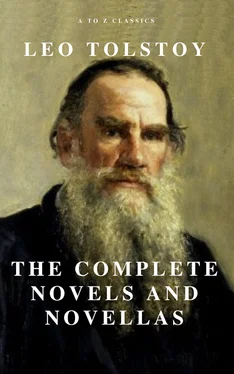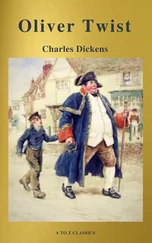Leo Tolstoy - Leo Tolstoy - The Complete Novels and Novellas (Active TOC) (A to Z Classics)
Здесь есть возможность читать онлайн «Leo Tolstoy - Leo Tolstoy - The Complete Novels and Novellas (Active TOC) (A to Z Classics)» — ознакомительный отрывок электронной книги совершенно бесплатно, а после прочтения отрывка купить полную версию. В некоторых случаях можно слушать аудио, скачать через торрент в формате fb2 и присутствует краткое содержание. Жанр: unrecognised, на английском языке. Описание произведения, (предисловие) а так же отзывы посетителей доступны на портале библиотеки ЛибКат.
- Название:Leo Tolstoy: The Complete Novels and Novellas (Active TOC) (A to Z Classics)
- Автор:
- Жанр:
- Год:неизвестен
- ISBN:нет данных
- Рейтинг книги:5 / 5. Голосов: 1
-
Избранное:Добавить в избранное
- Отзывы:
-
Ваша оценка:
- 100
- 1
- 2
- 3
- 4
- 5
Leo Tolstoy: The Complete Novels and Novellas (Active TOC) (A to Z Classics): краткое содержание, описание и аннотация
Предлагаем к чтению аннотацию, описание, краткое содержание или предисловие (зависит от того, что написал сам автор книги «Leo Tolstoy: The Complete Novels and Novellas (Active TOC) (A to Z Classics)»). Если вы не нашли необходимую информацию о книге — напишите в комментариях, мы постараемся отыскать её.
– Childhood
– Boyhood
– Youth
– Family Happiness
– The Cossacks
– War and Peace
– Anna Karenina
– The Death of Ivan Ilyich
– The Kreutzer Sonata
– Resurrection
– The Forged Coupon
– Hadji Murad
Leo Tolstoy: The Complete Novels and Novellas (Active TOC) (A to Z Classics) — читать онлайн ознакомительный отрывок
Ниже представлен текст книги, разбитый по страницам. Система сохранения места последней прочитанной страницы, позволяет с удобством читать онлайн бесплатно книгу «Leo Tolstoy: The Complete Novels and Novellas (Active TOC) (A to Z Classics)», без необходимости каждый раз заново искать на чём Вы остановились. Поставьте закладку, и сможете в любой момент перейти на страницу, на которой закончили чтение.
Интервал:
Закладка:
“No, it was not society, my dear,” he said.
“Why did you not exercise your authority?” I went on: “why did you not lock me up or kill me? That would have been better than the loss of all that formed my happiness. I should have been happy, instead of being ashamed.”
I began to sob again and hid my face.
Just then Katya and Sonya, wet and cheerful, came out to the veranda, laughing and talking loudly. They were silent as soon as they saw us, and went in again immediately.
We remained silent for a long time. I had had my cry out and felt relieved. I glanced at him. He was sitting with his head resting on his hand; he intended to make some reply to my glance, but only sighed deeply and resumed his former position.
I went up to him and removed his hand. His eyes turned thoughtfully to my face.
“Yes,” he began, as if continuing his thoughts aloud, “all of us, and especially you women, must have personal experience of all the nonsense of life, in order to get back to life itself; the evidence of other people is no good. At that time you had not got near the end of that charming nonsense which I admired in you. So I let you go through it alone, feeling that I had no right to put pressure on you, though my own time for that sort of thing was long past.”
“If you loved me,” I said, “how could you stand beside me and suffer me to go through it?”
“Because it was impossible for you to take my word for it, though you would have tried to. Personal experience was necessary, and now you have had it.”
“There was much calculation in all that,” I said, “but little love.”
And again we were silent.
“What you said just now is severe, but it is true,” he began, rising suddenly and beginning to walk about the veranda. “Yes, it is true. I was to blame,” he added, stopping opposite me; “I ought either to have kept myself from loving you at all, or to have loved you in a simpler way.”
“Let us forget it all,” I said timidly.
“No,” he said; “the past can never come back, never;” and his voice softened as he spoke.
“It is restored already,” I said, laying a hand on his shoulder.
He took my hand away and pressed it.
“I was wrong when I said that I did not regret the past. I do regret it; I weep for that past love which can never return. Who is to blame, I do not know. Love remains, but not the old love; its place remains, but it all wasted away and has lost all strength and substance; recollections are still left, and gratitude; but...”
“Do not say that!” I broke in. “Let all be as it was before! Surely that is possible?” I asked, looking into his eyes; but their gaze was clear and calm, and did not look deeply into mine.
Even while I spoke, I knew that my wishes and my petition were impossible. He smiled calmly and gently; and I thought it the smile of an old man.
“How young you are still!” he said, “and I am so old. What you seek in me is no longer there. Why deceive ourselves?” he added, still smiling.
I stood silent opposite to him, and my heart grew calmer.
“Don’t let us try to repeat life,” he went on. “Don’t let us make pretences to ourselves. Let us be thankful that there is an end of the old emotions and excitements. The excitement of searching is over for us; our quest is done, and happiness enough has fallen to our lot. Now we must stand aside and make room — for him, if you like,” he said, pointing to the nurse who was carrying Vanya out and had stopped at the veranda door. “that’s the truth, my dear one,” he said, drawing down my head and kissing it, not a lover any longer but an old friend.
The fragrant freshness of the night rose ever stronger and sweeter from the garden; the sounds and the silence grew more solemn; star after star began to twinkle overhead. I looked at him, and suddenly my heart grew light; it seemed that the cause of my suffering had been removed like an aching nerve. Suddenly I realized clearly and calmly that the past feeling, like the past time itself, was gone beyond recall, and that it would be not only impossible but painful and uncomfortable to bring it back. And after all, was that time so good which seemed to me so happy? and it was all so long, long ago!
“Time for tea!” he said, and we went together to the parlour. At the door we met the nurse with the baby. I took him in my arms, covered his bare little red legs, pressed him to me, and kissed him with the lightest touch of my lips. Half asleep, he moved the parted fingers of one creased little hand and opened dim little eyes, as if he was looking for something or recalling something. all at once his eyes rested on me, a spark of consciousness shone in them, the little pouting lips, parted before, now met and opened in a smile. “Mine, mine, mine!” I thought, pressing him to my breast with such an impulse of joy in every limb that I found it hard to restrain myself from hurting him. I fell to kissing the cold little feet, his stomach and hand and head with its thin covering of down. My husband came up to me, and I quickly covered the child’s face and uncovered it again.
“Ivan Sergeich!” said my husband, tickling him under the chin. But I made haste to cover Ivan Sergeich up again. None but I had any business to look long at him. I glanced at my husband. His eyes smiled as he looked at me; and Ii looked into them with an ease and happiness which I had not felt for a long time.
That day ended the romance of our marriage; the old feeling became a precious irrecoverable remembrance; but a new feeling of love for my children and the father of my children laid the foundation of a new life and a quite different happiness; and that life and happiness have lasted to the present time.
The Cossacks
First published : 1863
Translation : Aylmer Maude (1858-1938) & Louise Maude (1855-1939)
Chapter 1
Chapter 2
Chapter 3
Chapter 4
Chapter 5
Chapter 6
Chapter 7
Chapter 8
Chapter 9
Chapter 10
Chapter 11
Chapter 12
Chapter 13
Chapter 14
Chapter 15
Chapter 16
Chapter 17
Chapter 18
Chapter 19
Chapter 20
Chapter 21
Chapter 22
Chapter 23
Chapter 24
Chapter 25
Chapter 26
Chapter 27
Chapter 28
Chapter 29
Chapter 30
Chapter 31
Chapter 32
Chapter 33
Chapter 34
Chapter 35
Chapter 36
Chapter 37
Chapter 38
Chapter 39
Chapter 40
Chapter 41
Chapter 42
Chapter 1
All is quiet in Moscow. The squeak of wheels is seldom heard in the snow-covered street. There are no lights left in the windows and the street lamps have been extinguished. Only the sound of bells, borne over the city from the church towers, suggests the approach of morning. The streets are deserted. At rare intervals a night-cabman’s sledge kneads up the snow and sand in the street as the driver makes his way to another corner where he falls asleep while waiting for a fare. An old woman passes by on her way to church, where a few wax candles burn with a red light reflected on the gilt mountings of the icons. Workmen are already getting up after the long winter night and going to their work — but for the gentlefolk it is still evening.
From a window in Chevalier’s Restaurant a light — illegal at that hour — is still to be seen through a chink in the shutter. At the entrance a carriage, a sledge, and a cabman’s sledge, stand close together with their backs to the curbstone. A three-horse sledge from the post-station is there also. A yard-porter muffled up and pinched with cold is sheltering behind the corner of the house.
‘And what’s the good of all this jawing?’ thinks the footman who sits in the hall weary and haggard. ‘This always happens when I’m on duty.’ From the adjoining room are heard the voices of three young men, sitting there at a table on which are wine and the remains of supper. One, a rather plain, thin, neat little man, sits looking with tired kindly eyes at his friend, who is about to start on a journey. Another, a tall man, lies on a sofa beside a table on which are empty bottles, and plays with his watch-key. A third, wearing a short, fur-lined coat, is pacing up and down the room stopping now and then to crack an almond between his strong, rather thick, but well-tended fingers. He keeps smiling at something and his face and eyes are all aglow. He speaks warmly and gesticulates, but evidently does not find the words he wants and those that occur to him seem to him inadequate to express what has risen to his heart.
Читать дальшеИнтервал:
Закладка:
Похожие книги на «Leo Tolstoy: The Complete Novels and Novellas (Active TOC) (A to Z Classics)»
Представляем Вашему вниманию похожие книги на «Leo Tolstoy: The Complete Novels and Novellas (Active TOC) (A to Z Classics)» списком для выбора. Мы отобрали схожую по названию и смыслу литературу в надежде предоставить читателям больше вариантов отыскать новые, интересные, ещё непрочитанные произведения.
Обсуждение, отзывы о книге «Leo Tolstoy: The Complete Novels and Novellas (Active TOC) (A to Z Classics)» и просто собственные мнения читателей. Оставьте ваши комментарии, напишите, что Вы думаете о произведении, его смысле или главных героях. Укажите что конкретно понравилось, а что нет, и почему Вы так считаете.












